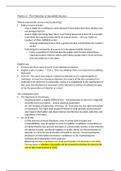Samenvatting
Summary Media Law Notes - The Protection of Journalistic Sources
- Vak
- Instelling
Includes: - Why do journalistic sources need protecting? - The Strasbourg Court - The Council of Europe: their views - CCA s10 – Headed “Sources of Information” – the English Cases - The Driving Force Behind the Enactment of the CCA – the influence of Strasbourg - Cases since the CCA –...
[Meer zien]




